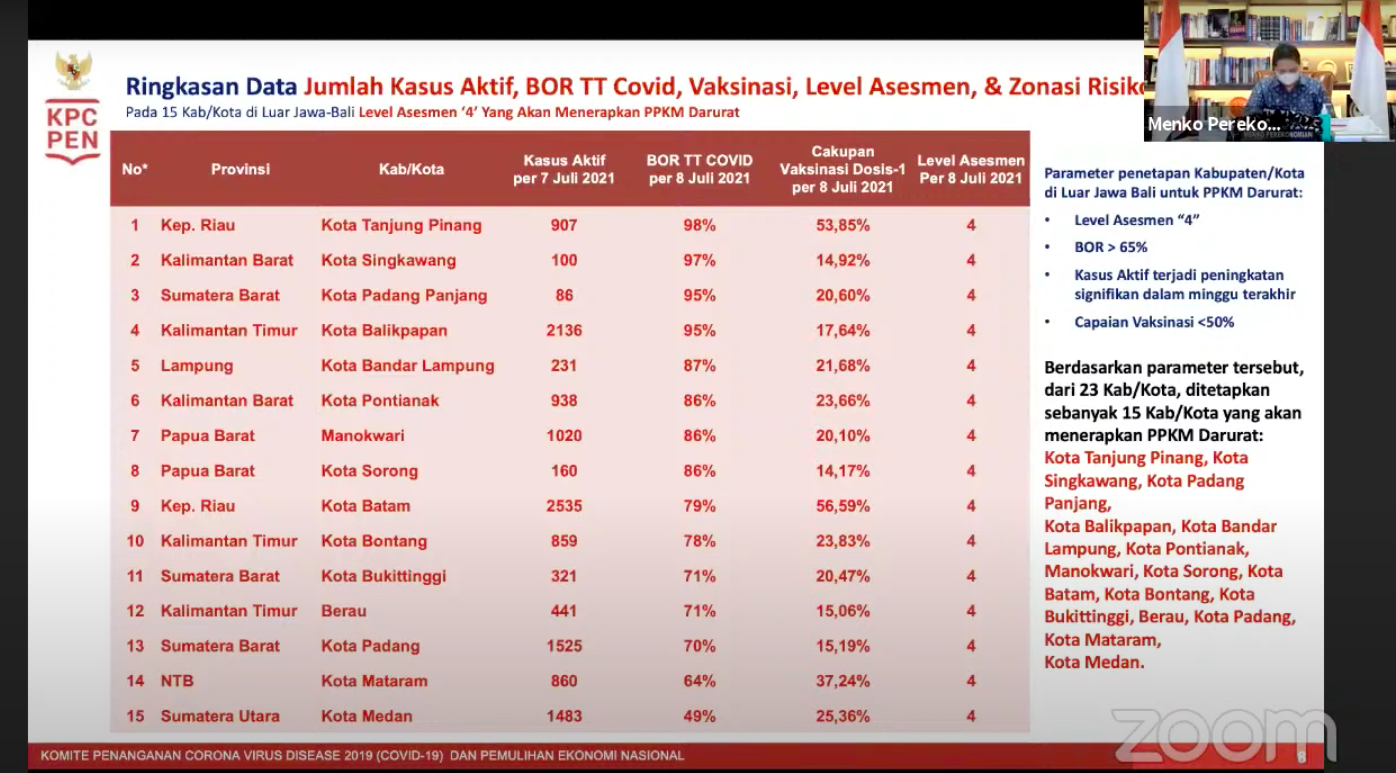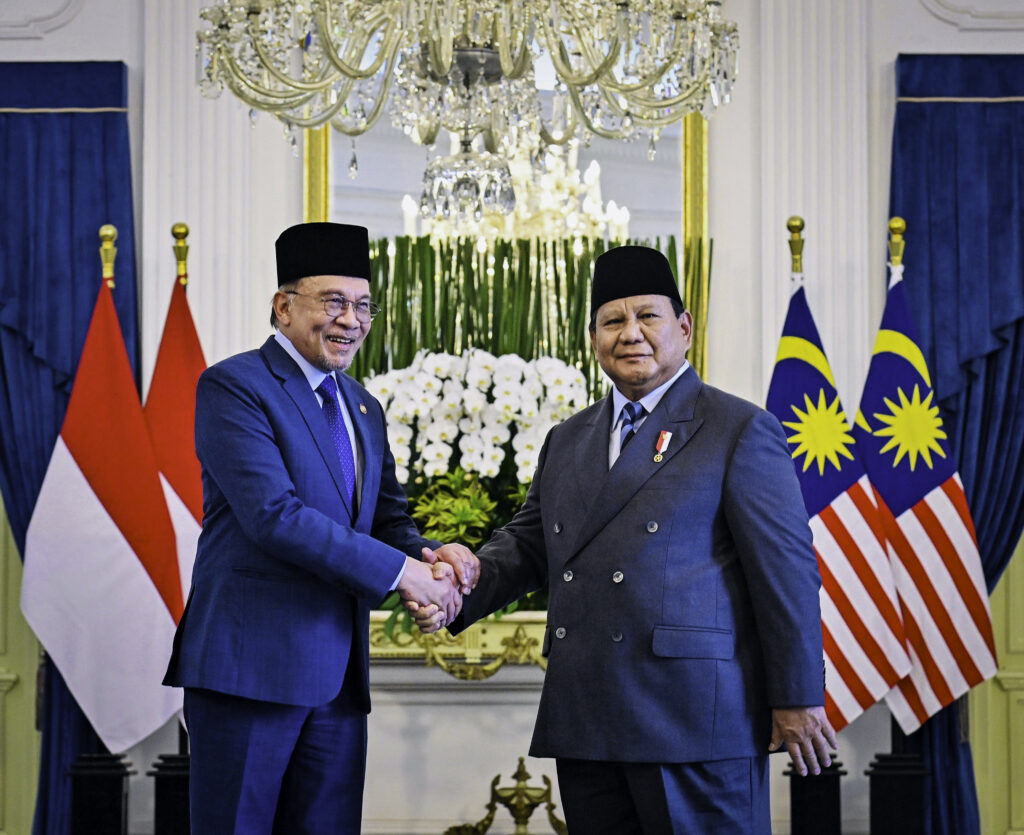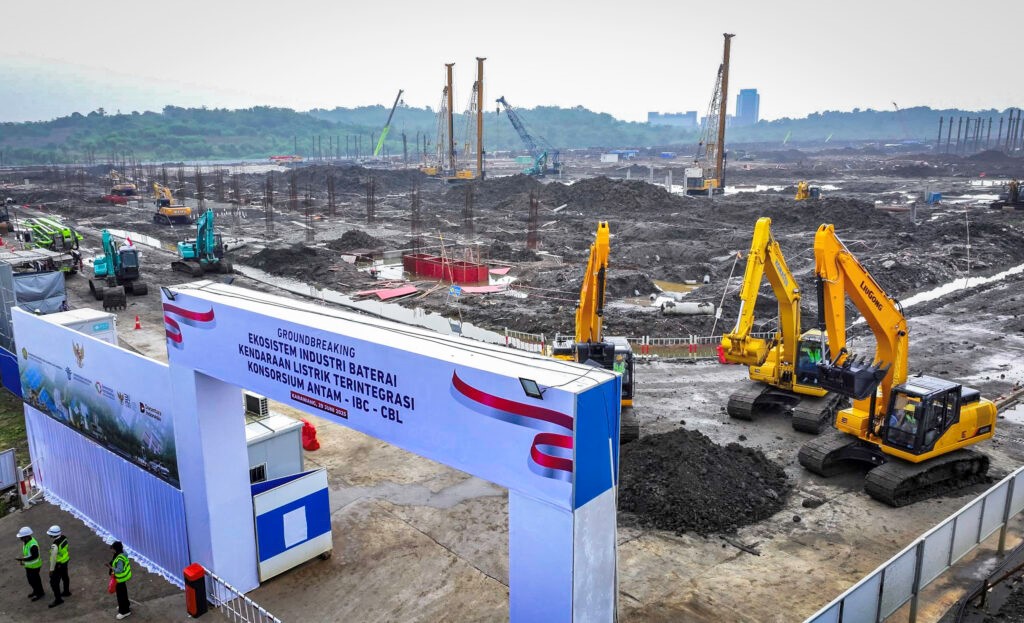Gov’t Expands Emergency Restrictions to Regions Outside Java, Bali

Coordinating Minister for Economic Affairs Airlangga Hartarto delivers a statement in a virtual press conference on Friday (09/07). Photo by: YouTube channel of Coordinating Ministry for Economic Affairs
The Government has announced it will impose emergency activity restrictions (emergency PPKM) in fiteen regencies/cities outside the islands of Java and Bali.
“The policy will apply from 12 to 20 July 2021 and the development in the 15 regencies / cities will be monitored on a daily basis,” Coordinating Minister for Economic Affairs Airlangga Hartarto said in a virtual press conference on Friday (09/07).
Those 15 regencies / cities are Bukittinggi, Padang, and Padang Panjang (West Sumatra province); Medan (North Sumatra province), Batam and Tanjungpinang (Riau Islands province); City of Bandar Lampung (Lampung province); Pontianak and Singkawang (West Kalimantan province); Berau, Balikpapan, and Bontang (East Kalimantan province); Mataram (West Nusa Tenggara province); Sorong and Manokwari (West Papua province).
The restrictions in those areas will be based on Instructions of Minister of Home Affairs Numbers 15, 16, and 18 of 2021. The provisions in the emergency activity restrictions are as follows:
- Office / workplace activities.
Non-essential sector should apply a 100-percent work from home (WFH) policy.
- Teaching and learning activities.
Teaching and learning activities (schools, colleges, academies, places of education/training) are carried out online.
- Essential sector activities.
-
- Essential sectors are health, food, beverages, energy, communication and information technology, finance, banking, payment systems, capital markets, logistics, hotels, construction, strategic industries, basic services, public utilities, national strategic objects, as well as basic needs.
- implementation of activities in essential sector such as finance and banking, capital markets, payment systems, information and communication technology, non-quarantine COVID-19 hotels, and export-oriented industries is conducted by applying 50 percent of maximum work from office (WFO);
- implementation of activities in essential Government sectors that provide urgent public services is conducted by applying 25 percent of maximum WFO with strict health protocols;
- implementation of activities in critical sector such as energy, health, security, logistics and transportation, food, beverage, supporting industries, petrochemicals, cement, national vital objects, disaster management, national strategic projects, construction, basic utilities (electricity and water), and industries producing the people’s daily needs is conducted by applying 100 percent of maximum work from office (WFO) and strict health protocols;
- for supermarkets, traditional markets, and grocery stores, operating hours are limited to 20.00 local time with a maximum capacity of 50 percent visitors;pharmacies and drug stores can operate 24 hours.
4. Eating / drinking activities in public places.
Food stalls, restaurants, cafes, street vendors, hawker stalls both in separate locations and those located in shopping centers/malls are only allowed to provide delivery / takeaway services and must not provide dine-in services.
- Activities at shopping centers / malls.
Shopping centers / malls / trade centers are temporarily closed, except for restaurants, supermarkets and convenience stores that can operate until 20.00 local time with a maximum of 50 percent visitors.
- Construction activities.
Construction sites (construction and project sites) are allowed to operate 100 percent by observing stricter health protocols.
- Worship activities.
Places of worship (mosques, prayer rooms, churches, temples, monasteries, and pagodas as well as other public places that function as places of worship) are temporarily closed.
- Activities in public areas.
Public facilities (public areas, public parks, public tourist attractions, and other public areas) are temporarily closed.
- Art, culture, and social activities.
- Arts/cultural activities, sports, and social activities are temporarily suspended; and
- Wedding receptions are prohibited during the implementation of the emergency PPKM.
- Meetings, seminars and offline meetings.
Governors, regents, and mayors must prohibit any form of activities than can cause crowds.
- Public transportation.
Public transportation, mass transportation, conventional and online taxis, motorbike taxis, as well as rental vehicles can operate with a maximum capacity of 70 percent by implementing stricter health protocols
- Domestic travelers with long-distance transportation.
Domestic travelers using private cars, motorbikes and long-distance public transportation (airplanes, buses and trains) must:
- show a vaccine card (the first dose of vaccine at the minimum);
- show D-2 PCR result for plane travelers and D-1 antigen test result for travelers using private cars, motorbikes, buses, trains, and ships; and
- the provisions as referred to in letters a and b only apply to arrivals and departures from and to the islands of Java and Bali and do not apply to transportation within the agglomeration area. Drivers of logistics vehicles and other goods transportation are excluded from the provision of showing a vaccine card
- Other provisions.
- Wearing face masks correctly and consistently when carrying out outdoor activities is imperative. It is not permitted to use a face shield without wearing a face mask; and
- Micro PPKM policy is still imposed in the neighborhood units/hamlets located in red zones. (PR of Coordinating Ministry for Economic Affairs/UN) (RI/EP)








